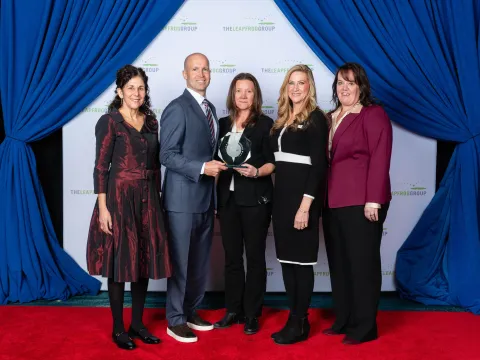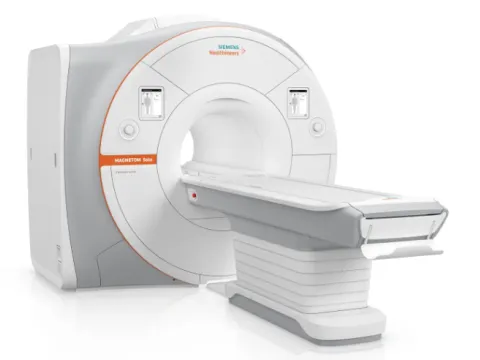- Lauren Williams

A microscopic image of H5N1 virus particles.
Sporadic mentions of H5N1 bird flu in newsfeeds just weeks ago have turned into what might seem like a flurry of headlines on any given day.
Health officials said Monday that a Louisiana patient who had been hospitalized with H5N1 died, marking the first U.S. death from the disease.
Many view bird flu as a looming public health threat given that 66 cases have been diagnosed in humans in the past 10 months.
Vincent Hsu, MD, an infectious disease specialist and infection control officer for AdventHealth, sees the outbreak as an opportunity to apply existing influenza knowledge -- particularly the lessons learned from the COVID-19 pandemic.
"As long as there’s interactions between humans and animals, there’s always going to be the potential for circulating viruses to reassort and cause mutation," Dr. Hsu said.
Influenza viruses are transmitted, usually in droplets, from human to human or from animal to human. But when conditions set the stage for mutation to occur, viruses formerly transmitted between animals and then from animals to humans may find a human-to-human route.
"The preventive actions we take every day to protect ourselves and others can make a difference."
"If you get the right conditions for different flu viruses to mix together, the concern is that could be the catalyst that makes human infection much more serious and potentially transmissible from person to person," Dr. Hsu said.
Although the first severe case of the virus was recently reported, bird flu has been widespread in wild birds globally since the 1990s.
In the past year, several dozen reported cases across 10 states have sparked concerns over potential strain mutation, putting individuals like farmworkers at high risk.
On Dec. 18, California officials proclaimed a state of emergency after cases were detected in dairy cows on farms in Southern California, signaling the need for a statewide approach to mitigate the spread of the virus.
Nationally, the U.S. Department of Agriculture issued a federal order to test milk nationwide; and the U.S. Food and Drug Administration began domestic sampling of aged raw cow's milk cheese.
"The most important thing is to try to identify and control the spread as early as possible, before it becomes widespread," Dr. Hsu said. "We have not seen any evidence of this particular strain being passed from human to human. But that could change, and that is where we have to be very careful."
Diagnosing bird flu infections is a multistep process. Initial tests can be performed quickly in hospital or commercial labs. But specialized lab tests, usually at state or CDC public health labs, are required to make the confirmation.
Experts are urging farmworkers to inform their health care providers if they get sick so that any unusual activity can be identified.

Dr. Hsu said that because the risk of bird flu to the general public is low, there is no extraordinary need for preventing respiratory illness. But usual basic prevention methods should be applied.
Just as with other respiratory viruses making the rounds this winter, transmission can be reduced by getting vaccinated against the flu, frequent handwashing, covering coughs and sneezes, staying home when sick and wearing a mask in public when venturing out can’t be avoided.
"The CDC and public health departments are looking closely at people who work in the animal industry to see how serious diseases are and to observe any changes in how severe this disease could be or whether it could be passed on," Dr. Hsu said.
Although H5-specific vaccines have been used to vaccinate animals, none have been authorized for human use yet.
Part of the challenge is in predicting which strain of the virus will be most likely to spread easily and cause severe disease among humans.
The good news, Dr. Hsu says, is that influenza is not a novel virus, and scientists are working with the storehouse of knowledge attained from years of influenza activity as well as the COVID-19 pandemic.
"The fact that this is a known virus is good because we have some tools already in our toolbox to prepare as opposed to something that is completely unknown," he said. "One of those tools is Tamiflu, a common antiviral used to treat seasonal influenza that is also effective against the H5 influenza virus."
"This is not going to go away," Dr. Hsu said. "I believe that H5 virus, because it's so prevalent in the animal population, is always going to be there. But the preventive actions we take every day to protect ourselves and others can make a difference."
Click here to read more about the precautions you can take against bird flu.
Recent News

AdventHealth Avista Recognized as a Top Teaching Hospital in Colorado for Patient Safety and Quality Care
For patients and families, feeling safe, heard, and well cared for is foundational to healing. That commitment to whole-person care is why AdventHealth Avista has been recognized as one of Colorado’s...

Phoebe Carpenter, APRN-CNP, joins AdventHealth Medical Group Family Medicine, Internal Medicine & Pediatrics at Curtis Parkway
AdventHealth is pleased to announce that Phoebe Carpenter, APRN-CNP, has joined AdventHealth Medical Group Family Medicine, Internal Medicine & Pediatrics at Curtis Parkway.

Pilot survives heart attack thanks to Flight 1 and whole-person connected care
From ER to air to cath lab, a seamless system delivered lifesaving treatment in under 90 minutes.

Pulmonologist joins AdventHealth Waterman
From nutrition and ICU to advanced bronchoscopy, Dr. Alba Rivera-Díaz brings bilingual, whole-person lung care to Lake County.

AdventHealth Avista opens food pantry to support community health
AdventHealth Avista has taken a significant step toward addressing food insecurity, a key priority identified in its Community Health Needs Assessment by opening a food pantry on its first floor. This...

AdventHealth Porter Earns COPPER Designation, Strengthening Pediatric Emergency Care
AdventHealth Porter is proud to announce that its Emergency Department has earned the Pediatric Advanced COPPER designation, a significant milestone that reflects a deep commitment to providing safe...

Three AdventHealth hospitals in Florida’s Volusia and Flagler counties earn top Leapfrog honors
Residents of Volusia and Flagler counties now have national confirmation of something many rely on every day: safe, high-quality hospital care close to home.

AdventHealth DeLand investing in next-generation MRI technology to enhance patient care
AdventHealth DeLand will soon install a new MRI system designed to deliver faster exams, sharper images and a more comfortable experience for patients in West Volusia.

AdventHealth Wauchula earns 2025 Leapfrog Top Rural Hospital Award for outstanding quality and safety
People in Hardee County can feel confident knowing their local hospital is among the safest in the nation with AdventHealth Wauchula being named a Top Rural Hospital by The Leapfrog Group for its...

Innovative new procedure offers hope for heart transplant candidates at high risk for rejection
Innovation at AdventHealth is driven by one purpose: helping people heal in body, mind and spirit.

NC Supreme Court clears way for first phase of AdventHealth’s new hospital in Weaverville
AdventHealth is grateful for community support as NC Supreme Court decision clears the way for a new hospital.

The hidden cancer one clinician caught – and the process improvements she says matter most
Shana Vongkhankeo, APRN, discovered an unusual thyroid enlargement during a routine physical for a teenage patient, leading to a life-saving cancer diagnosis that highlighted how being fully present...
